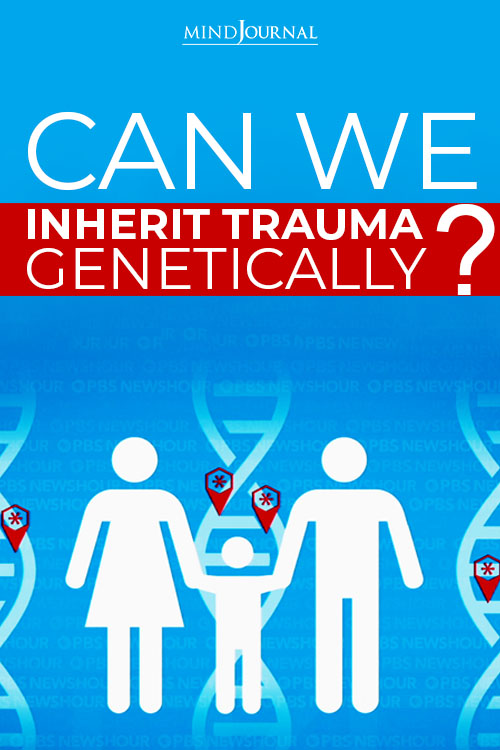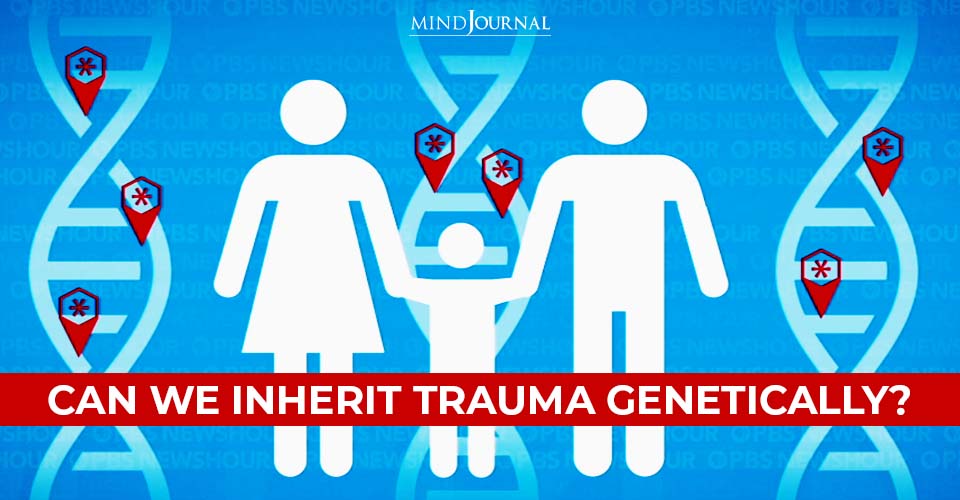Are you looking for someone to blame for the stress and trauma in your life? What if we can inherit trauma genetically?
There’s some pretty strong evidence that parental trauma, like extreme stress (we’re looking right at you coronavirus) can alter how genes are passed down.
We are living in strange times, with much of the world under quarantine for the novel coronavirus—and that’s precisely the kind of stress that may impact future offspring according to some scientists. A growing body of research suggests that trauma (like from extreme stress or starvation among many other things) can be passed from one generation to the next.
Related: Coronavirus Anxiety: 5 Things You Can Do To Beat It
Here’s how: Trauma can leave a chemical mark on a person’s genes, which can then be passed down to future generations. This mark doesn’t cause a genetic mutation, but it does alter the mechanism by which the gene is expressed. This alteration is not genetic, but epigenetic.
We spoke with Dr. Chris Mason, Associate Professor at Weill Cornell Medicine, with appointments at the Tri-Institutional Program in Computational Biology and Medicine between Cornell, Memorial Sloan-Kettering Cancer Center and Rockefeller University, and Director of the Mason Lab. He shared that “epigenetics, in simplified terms, is the study of the biological control mechanisms of DNA—the light switches that turn genes on or off.
What does that mean?
In essence: epigenetics control how or why your genes are expressed.”
What would have seemed preposterous 20 years ago has become a fast-emerging field of study. Today the idea that a person’s experience could alter their biology, and behavior of their children and grandchildren has gained serious traction. Animal and some smaller human studies have shown that exposure to stressors like immense stress or cold can trigger metabolic changes in subsequent generations—and we may just be living in such a time as we grapple with the mounting COVID-19 crisis.
Related: How Toxic Family Dynamics Can Cause C-PTSD In Emotionally Intense Children

So, What Exactly Are These Epigenetic Studies?
Differences among groups who had gone through extreme physical and psychological stress, like Holocaust survivors, those who were born to parents who lived through “The Dutch Hunger Winter,” and sons of Confederate prisoner-of-war soldiers in the American Civil War, all make the case the most clearly, but they’re not the whole picture. There has also been a lot of work in the lab focused on this phenomenon, and that work really accelerated after The Human Genome Project (HGP) was completed in 2003. Here’s a look at what scientists have learned from both case studies and experiments.
Related: PTSD: 4 Surprising Lessons From a Recent Research
How Extreme Situations Have Impacted Offspring
Mason shared that the field of epigenetics gained real traction about a decade ago, when scientists published seminal research on the Dutch Hunger Winter, an extended period of famine that took place towards the end of World War II when the Nazis blocked food supplies in October 1944, thrusting much of the Netherlands into famine. When the Dutch were liberated in May 1945, more than 20,000 had died of starvation. Pregnant women were particularly vulnerable; and the famine impacted the unborn children for the rest of their lives.
Scientists found that those who had been in utero during the famine were a few pounds heavier than average. (The thinking goes that the mothers, because they were starving, automatically quieted a gene in their unborn children involved in burning the body’s fuel.) When the children reached middle age, they had higher LDL (“bad”) cholesterol and triglyceride levels.
They also suffered higher rates of obesity, diabetes, cardiovascular disease, and schizophrenia. When scientists looked into why, they found that these children carried a specific chemical mark—an epigenetic signature—on one of their genes.
Dr. Rachel Yehuda, Director of the Traumatic Stress Studies Division at the Icahn School of Medicine at Mount Sinai in New York City, conducted a 2015 study on the children of 40 Holocaust survivors. She found that they had epigenetic changes to a gene linked to their levels of cortisol, a hormone involved in the stress response. She also found a distinctive pattern of DNA methylation, another epigenetic marker. The study concluded that both parents and unborn children were affected on a genetic level.
While much of Yehuda’s work has focused on the children of Holocaust survivors, she also observed that infants born to mothers who were pregnant on 9/11 had low cortisol levels, which were associated with the presence of maternal PTSD. Again, more evidence for the theory of epigenetics. Even still, she says it is “premature” to conclude that trauma can cause heritable changes and worries that research may create a bleak narrative that one generation’s trauma may permanently scar future generations.
There’s Evidence in Other Animals, Too
“The proof may be in the worm,” shared Mason. Hmmm. Let’s explore that one. No one would argue that decaying organic matter and rotten fruit makes for a rich trove of bacteria. In other words: a good meal for the nematode worm.
But some harmful bacteria lurk in that rotting bounty, which make for a lethal meal when ingested. Unfortunately, the worms can’t always distinguish the good (nutritious) bacteria from the bad until it is too late. Still, this doesn’t stop the worms from gobbling down all of the bacteria.
What’s interesting, though, is that Princeton University researchers noticed that before the worms die from ingesting the harmful bacteria, they often lay eggs. Odd timing, right? Well, even stranger is that these offspring consistently avoid that specific bacteria—exhibiting what is known as pathogen avoidance—a behavioral trait the mothers learned at the very end of their lives. These findings, published in Cell in June 2019—show that this learned behavior can be transmitted to the worm’s offspring through the fourth generation, giving them an edge in survival via an epigenetic mechanism involving RNA.
Related: 9 Vital Steps To Protect Your Mental Health (backed by science)
Now, that’s some pretty convincing evidence for the epigenetic argument that we can inherit trauma genetically. And, there’s more. Other research in mice has found that parents exposed to toxins, altered diets, or challenging environments have offspring that show behavioral changes, weight gain, and can impact the brain development of offspring.
Where Does That Leave Us With COVID-19?
Much of this research on inheriting trauma is incredibly compelling, but until more studies are done on the intergenerational effects of trauma, we have to wait to tease out all the possible implications.
Could the current COVID-19 pandemic and the extreme stress it is causing the world-at-large cause epigenetic changes to offspring? It’s possible, but only time will tell.
Let us know what do you think!
Written by: Karina Margit Erdelyi
Originally appeared on: Psycom


Leave a Reply
You must be logged in to post a comment.